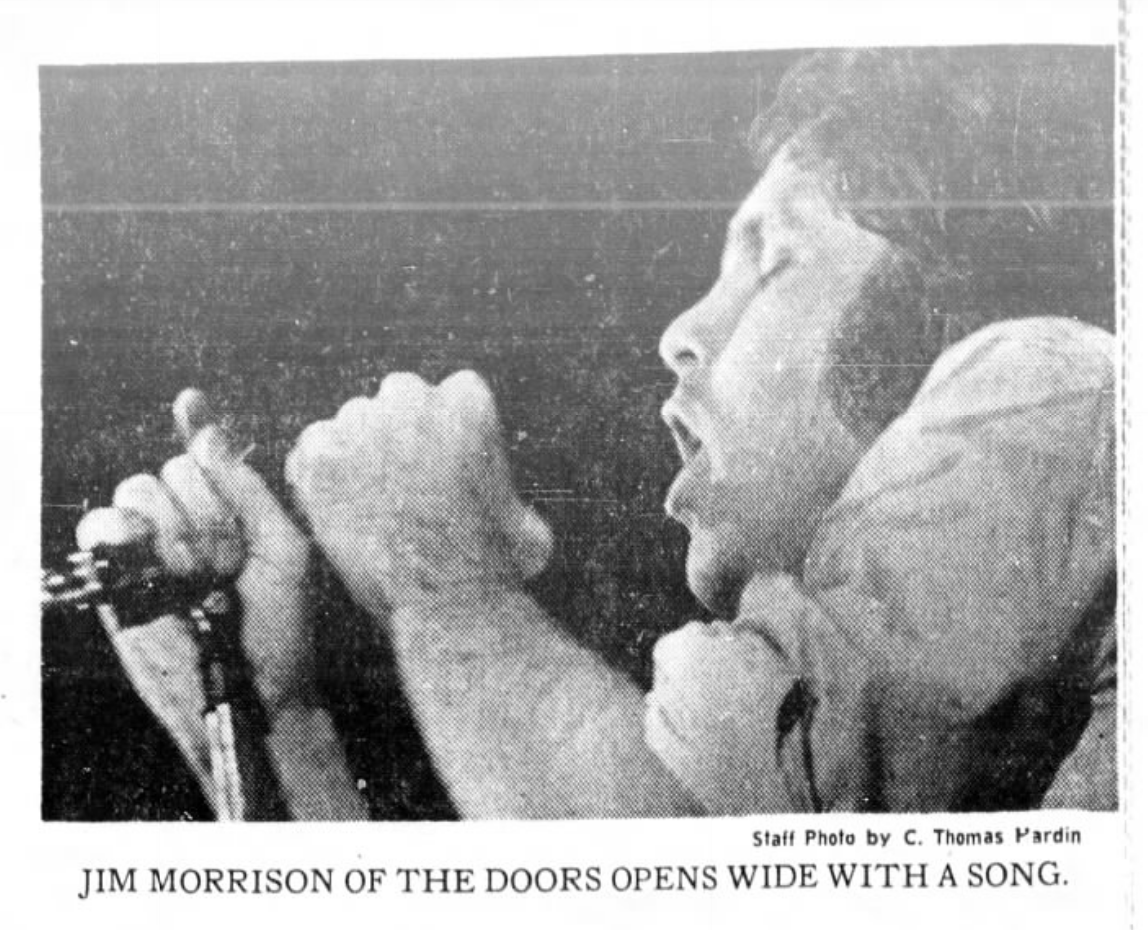What fans around the world were hearing, according to Ray Manzarek, was “electric eclectic,” a mix of jazz, blues, and hard rock — all infused with a mix of American grit and psychedelic vibes that the band brought to life. That combination came from the gifts of each band member, from Ray’s intensity and grace, Robby’s charging guitar, John’s jazzy beat and musical spirit, and Jim’s “literary side.”
Read moreThe Doors Light Up the Night on Halloween in Kentucky
The Doors played Louisville, Kentucky, on Halloween Night in 1968; crowd loved the show, to the dismay of journalist Glenn Rutherford
Jim Morrison on stage on Halloween night 1968
By the fall of 1968, the Doors had released three albums — all had reached #1 on the charts — and had two #1 singles: “Light My Fire” and “Hello, I Love You.” Although it might seem to contemporary readers that the band was on top of the world, the Doors were also less than a year removed from the infamous New Haven concert when a backstage run in with police, got Jim Morrison maced, and later arrested on stage after he baited the officers guarding the band by telling the packed crowd about the incident.
While the Doors were one of the most popular bands in the world based on record sales and numbers of fans, Morrison’s New Haven arrest turned them into the establishment’s #1 suspect. Lots of bad vibes about hippies, drugs, and the Sixties were dropped on the band and their front man, who seemed at ease in whipping young people into a frenzy.
"Weird happening," says reporter
Journalist Glenn Rutherford of the Louisville Courier-Journal covered the band’s concert in Kentucky on its 1968 tour. His descriptions of the crowd epitomized the way many people viewed the Doors and the counterculture in that era — “weird,” “strangely dressed” — as well as the oddity that hippies and young people embodied: “apparently look that way all the time.”
Morrison a sex symbol
Like many reporters and writers during the heyday of the Doors, Rutherford juxtaposed the grungy band and its fans to Morrison’s “sex symbol” status. Again, the idea is that these people — hippies, musicians, those from California — are not like us, as if they have invaded Kentucky and polluted its good citizens.
[Rutherford wasn’t alone in seeming to dislike the Doors. They were a polarizing band in the 1960s, which adds spice to our often-nostalgic views of the era today. What seems amazing, though, is how threatening the band and Morrison specifically was to so many people!]
"Neanderthal pounding"
The most eye-opening part of Rutherford’s review came near the end of the piece when he compared the music to “neanderthal pounding.” Of course, even some hardened critics during the band’s run reacted negatively to Morrison’s poetic posturing, his voice, or the pomposity they saw in the band’s “erotic politicians” stance. However, few journalists blasted the music emanating from Ray Manzarek’s keyboards, Robby Krieger’s guitar, or John Densmore’s drum kit.
In contrast, even when Morrison was at his drunken worst, observers noted how tight the Doors were as musicians. The comparison of them to a jazz trio was a high compliment.
Roadhouse Blues: Morrison, the Doors, and the Death Days of the Sixties by cultural historian Bob Batchelor
In his scribbling about “neanderthal pounding,” what the journalist completely missed is the beauty of the song he quoted: “Soul Kitchen.”
On the surface, “Soul Kitchen” seems like a simple ditty, an ode to a diner the band had haunted. But, a deeper examination of Morrison’s poetics reveals a much deeper, more meaningful exploration of lost love and its consequences.
Well, your fingers weave quick minarets
Speak in secret alphabets
I light another cigarette
Learn to forget, learn to forget
Learn to forget, learn to forget— Jim Morrison, “Soul Kitchen”
The narrator laments his love’s secret language and begs for her acceptance. Yet, when she turns him out, he is forced to “wander” and ends up “stumblin’ in the neon groves” of Los Angeles.
Like many of Morrison’s lyrics, “Soul Kitchen” is evergreen and open to multiple interpretations. The great rock critic and aficionado Paul Williams compared “Soul Kitchen” to Bob Dylan’s classic “Blowin’ In the Wind.”
Both songs ask the listener’s mind to expand to places known and unknown via unanswerable questions that are deeper than imagined on the surface, even when they might allude to a specific moment in time.
So much for neanderthal pounding…




